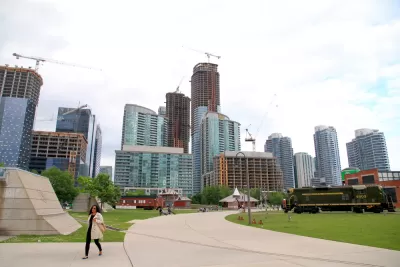A proposed inclusionary zoning scheme in Ontario would enable the first examples of the controversial housing policy in Canada.

Brian Barth reports on the ongoing sage of the province of Ontario's Promoting Affordable Housing Act, legislation approved in December 2016 that authorized municipalities to implement inclusionary zoning. The catch: "the legislation said that cities had to hold tight on implementing IZ until the minister of housing had a chance to come up with the rules of the road."
A year later, the Minster of Housing produced a draft version of the rules, but the result is a "downsized" version of inclusionary zoning, according to Barth. "The draft is inclusive with regard to developers—but with regard to lower-income city-dwellers, not so much."
While the inclusionary policies adopted in the United States set a minimum requirement for affordable housing to be included in new developments, the Ontario version "prohibits cities from mandating affordable rates for more than 5 percent of units built in low-density areas; in higher-density areas, the cap is 10 percent." The draft inclusionary zoning rules would also prohibit inclusionary zoning for rental properties.
Affordable housing advocates, such as Social Planning Toronto, have been marshaling evidence in an attempt to prove that draft rules would produce far less affordable housing than the province needs. The article includes a lot more detail about the political debate surrounding inclusionary zoning in Ontario, while referencing the ongoing questions and controversies over the policy in the United States.
FULL STORY: Inclusionary Zoning Gets Downsized in Ontario

Planetizen Federal Action Tracker
A weekly monitor of how Trump’s orders and actions are impacting planners and planning in America.

Vehicle-related Deaths Drop 29% in Richmond, VA
The seventh year of the city's Vision Zero strategy also cut the number of people killed in alcohol-related crashes by half.

As Trump Phases Out FEMA, Is It Time to Flee the Floodplains?
With less federal funding available for disaster relief efforts, the need to relocate at-risk communities is more urgent than ever.

US Rents Squeezing Low-Income Tenants
Despite a recent — and slowing — apartment construction boom, renters at the lower end of the income scale are still struggling to find housing.

Tech Tools Help Tenants Push Back Against Problematic Landlords
Shelterforce found more than a dozen examples of tenant-serving technology that help renters identify landlords, respond to eviction, fight back against housing discrimination, and more.

More Apartments Are Being Built in Less-Dense Areas
Rising housing costs in urban cores and a demand for rental housing is driving more multifamily development to exurbs and small metros.
Urban Design for Planners 1: Software Tools
This six-course series explores essential urban design concepts using open source software and equips planners with the tools they need to participate fully in the urban design process.
Planning for Universal Design
Learn the tools for implementing Universal Design in planning regulations.
Borough of Carlisle
Smith Gee Studio
City of Camden Redevelopment Agency
City of Astoria
Transportation Research & Education Center (TREC) at Portland State University
Camden Redevelopment Agency
City of Claremont
Municipality of Princeton (NJ)





























